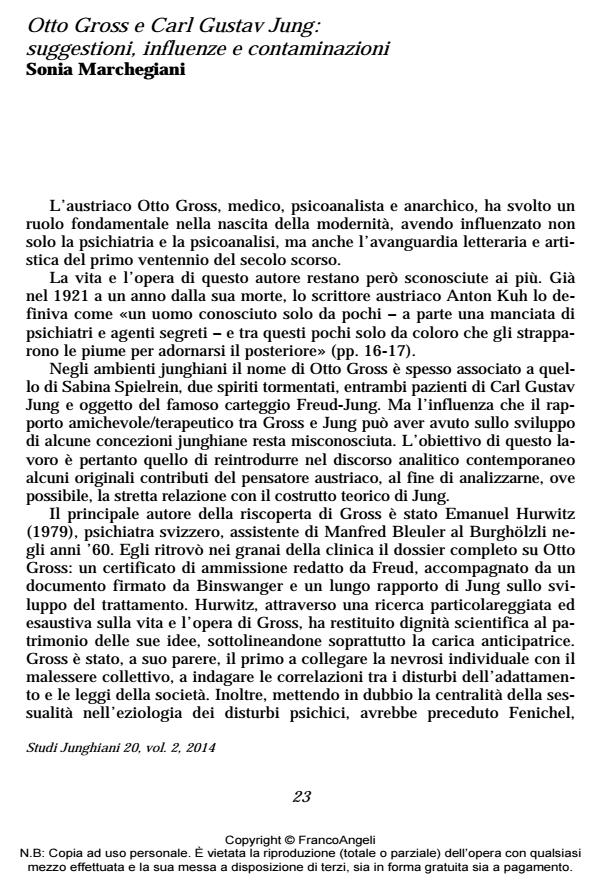Otto Gross and Carl Gustav Jung: suggestions, influences andcontaminations
Journal title STUDI JUNGHIANI
Author/s Sonia Marchegiani
Publishing Year 2015 Issue 2014/40
Language Italian Pages 18 P. 23-40 File size 104 KB
DOI 10.3280/JUN2014-040002
DOI is like a bar code for intellectual property: to have more infomation
click here
Below, you can see the article first page
If you want to buy this article in PDF format, you can do it, following the instructions to buy download credits

FrancoAngeli is member of Publishers International Linking Association, Inc (PILA), a not-for-profit association which run the CrossRef service enabling links to and from online scholarly content.
Otto Gross, physician, psychoanalyst and anarchist, played a key role in the birth of modernity,affecting not only psychiatry and psychoanalysis, but also the literary and artisticavant-garde of the first two decades of the last century. The goal of this work is to reintroduceinto contemporary analytical discourse some original contributions of the Austrianthinker, in order to analyze, where possible, the close relationship with the theoretical constructof Jung.
Keywords: Psychosis, disintegration of consciousness, dementia sejunctiva, secondaryfunction, mutual analysis
- Frank L. (1952) Links wo das Herz ist. München: Nymphenburger.
- Freud S. (1899). Die Traumdeutung (trad. it. L’interpretazione dei sogni. In: Opere, vol. 3. Torino: Bollati Boringhieri, 1966).
- Freud S. (1905). Der Witz und seine Beziehung zum Unbewussten (trad. it. Il motto di spirito e il suo rapporto con l’inconscio. In: Opere, vol. 5. Torino: Bollati Boringhieri, 1972).
- Freud S. (1906-1913). Epistolari. Lettere tra Freud e Jung 1906-1913. Torino: Bollati Boringhieri, 1990.
- Freud S. (1915). Das Unbewusste (trad. it. L’inconscio. In: Opere, vol. 8. Torino: Bollati Boringhieri, 1976).
- Freud S. (1925). Die Verneinung (trad. it. La negazione. In: Opere, vol. 10. Torino: Bollati Boringhieri, 2000).
- Green M. (1999). Otto Gross. Freudian Psychoanalist. 1877-1920. Literature and Ideas. Lewiston, Queenston, Lampeter: Edwin Mellen Press.
- Gross H. (1905). Deportation und Degeneration. Politisch-Antropologische Revue, 4: 281-316.
- Gross O. (1902). Die cerebrale Sekundärfunction. Leipzig: Vogel.
- Gross O. (1904a). Über Bewusstseinszerfall. Monatsschrift für Psychiatrie und Neurologie,
- 15: 45-51. Gross O. (1904b). Zur Nomenclatur “Dementia Sejunctiva”. Neurologisches Zentralblatt, 23: 1144-1146.
- Gross O. (1904/05). Zur Differentialdiagnostik negativistischer Phänomene. Psychiatrisch-Neurologische Wochenschrift, 6, 37: 345-353; 38: 357-363.
- Gross O. (1907). Das Freud’sche Ideogenitätsmoment und seine Bedeutung im manischdepressiven Irresein Kraepelins. Leipzig: Vogel.
- Gross O. (1909). Über psychopathische Minderwertigkeiten. Wien: Wilhelm Braumüller.
- Gross O. (1914). Über Destruktionssymbolik. Zentralblatt für Psychoanalyse und Psychotherapie, 4: 525-534 (trad. it. in: Gross O. Senza Freni. Firenze: Ed. Gratis, 1993).
- Gross O. (1918). Die Orientirung der Geistigen. Sowiet, 5: 1-5.
- Gullotta C. (1994). Introduzione. In: Psicologia della dementia praecox di C.G. Jung (1907). Milano: Mondadori.
- Jung C.G. (1907). Über die Psychologie der Dementia Praecox (trad. it. Psicologia della dementia praecox. In: Opere, vol. 3. Torino: Bollati Boringhieri, 1999).
- Jung C.G. (1909/1949). Die Bedeutung des Vaters für des Schicksal des Einzelnen (trad. it. L’importanza del padre nel destino dell’individuo. In: Opere, vol. 4. Torino: Bollati Boringhieri, 1996).
- Jung C.G. (1921). Psychologische Typen (trad. it. Tipi psicologici. In: Opere, vol. 6. Torino: Bollati Boringhieri, 1996).
- Jung C.G. (1946). Die Psychologie der Übertragung (trad. it. La psicologia della traslazione. In: Opere, vol. 16. Torino: Bollati Boringhieri, 1993).
- Heuer G. (2001). Jung’s twin brother: Otto Gross and Carl Gustav Jung. Journal of Analytical Psychology, 46: 655-688.
- Hurwitz E. (1979). Otto Gross. Paradies-Sucher zwischen Freud und Jung. Zurich: Suhrkamp.
- Kraepelin E. (1899). Trattato di Psichiatria. Milano: Vallardi, 1907.
- Kuh A. (1921). Juden un Deutsche. Ein Resumé. Berlin: Erich Rei.
- Lagi P.L. (1994). Otto Gross: una scommessa perduta. Contrappunto, 14: 51-61.
- Mühsam E. (1931). Namen und Menschen. Unpolitische Erinnerungen. Berlin.
- Otten K. (1963). Wurzeln. Neuwied-Berlin: Luchterhand.
- Szittya E. (1923). Das Kuriositäten-Kabinett. Konstanz: See.
- Vitolo A. (1987). Freud, Gross, Spielrein alle origini del tema paterno in Jung. Rivista di psicologia analitica, 35: 188-205.
- Werfel F. (1953). Barbara oder die Frömmigkeit. Frankfurt a.M.-Hamburg: Fischer.
- Zanasi G. (1993). Il Caso Gross. L’anima espressionista, la psicanalisi e l’utopia della felicità. Napoli: Liguori Editore.
- Becher J.R. (1940). Abschied. Moskau: Das internationale Buch.
- Bleuler E. (1908). Die Prognose der Dementia Praecox. Allgem Zeitschr. f. Psychiat. u. Psych-Gericht. Med., vol. 65: 436-464.
- Bleuler E. (1911). Dementia Praecox oder Gruppe der Schizophrenien. Leipzig, Wien: Deuticke (trad. it. Dementia Praecox o il gruppo delle schizofrenie. Roma: La Nuova Italia Scientifica, 1985).
Sonia Marchegiani, Otto Gross e Carl Gustav Jung: suggestioni, influenze e contaminazioni in "STUDI JUNGHIANI" 40/2014, pp 23-40, DOI: 10.3280/JUN2014-040002